In May 2023, we successfully hosted and co-organized the 4th international conference of the Society for Interdisciplinary Placebo Studies (SIPS) in Duisburg in the beautiful Landschaftspark. You can rewatch the press conference and science slam now on the SFB/TRR 289’s Youtube channel. Don’t forget to subscribe here!
SIPS press conference and science slam now watchable on YouTube!
The Bingel Laboratory
Translational Pain Research Unit
University Medicine Essen
Prof. Dr. Ulrike Bingel
News
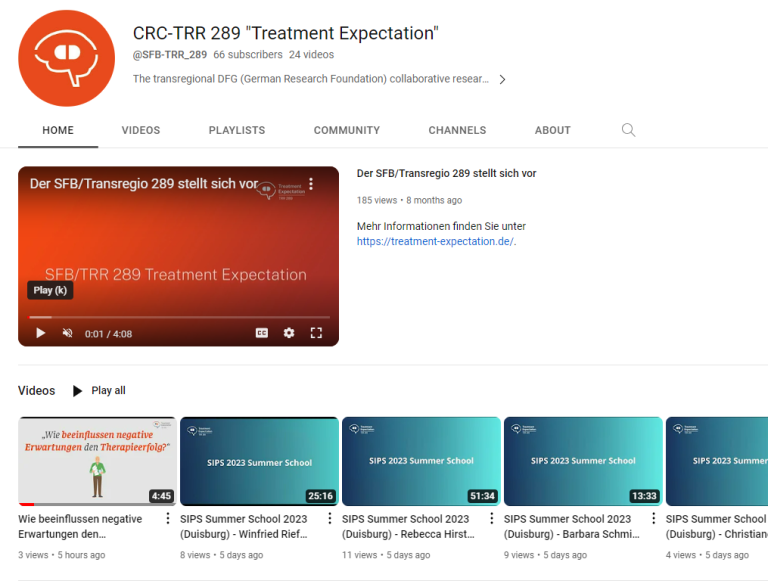
SIPS press conference and science slam now watchable on YouTube!
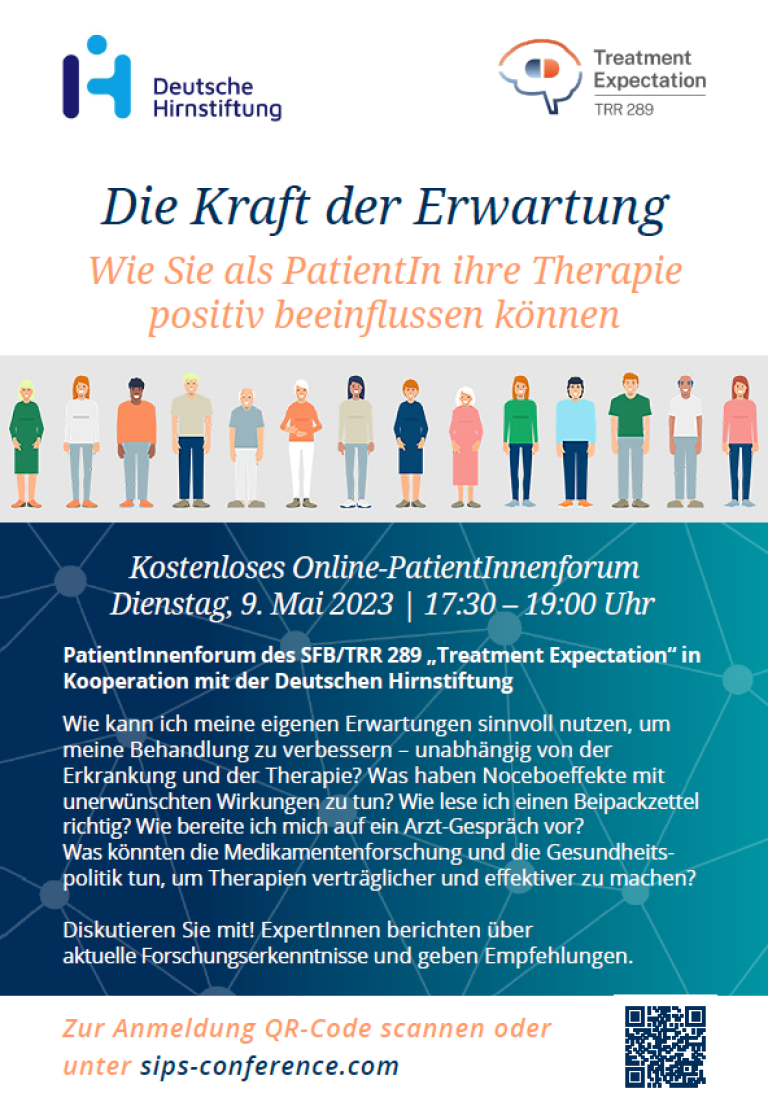
Online patient forum on placebo and nocebo effects (in German)
How can I use my own expectations in a meaningful way to improve my treatment – regardless of the disease and the therapy? What do nocebo effects have to do with have to do with adverse effects? How do I read a package insert correctly? How do I prepare for a consultation with a doctor? What could drug research and health policy do to make therapies more do to make therapies more tolerable and effective? You can now rewatch this forum on YouTube.
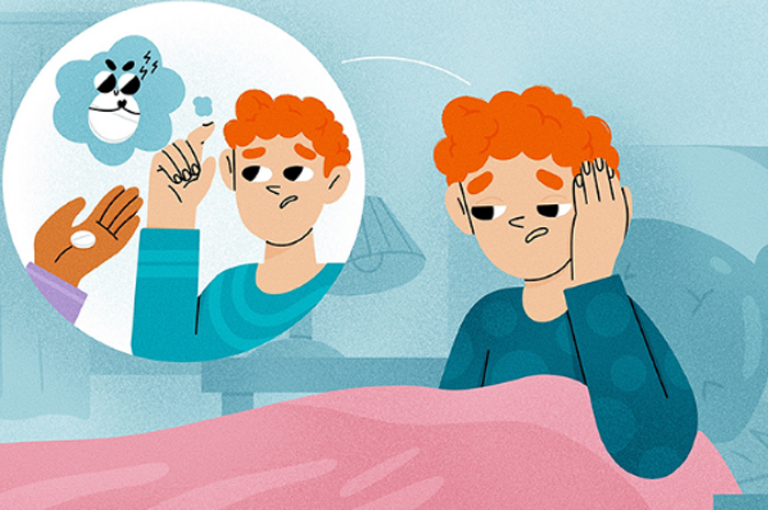
Nocebo effect – the placebo’s “evil twin”
Treatments are designed to help people fight diseases or their symptoms, and they are supposed to make us feel better. However, some treatments can have unpleasant side effects. But did you know that we can sometimes feel side effects because we expect them to happen? Imagine that you have a cold and your parents give you a pill to help you get better. If they tell you that the pill could give you a headache, you might feel the headache coming on as soon as you take it—but if they had not told you, you might not have felt the headache at all. Such negative expectations are the driving force behind what is known as the nocebo effect. This article explains what the nocebo effect is, how it works, and how we can combat it.
This article was written for children between 12 and 15 years by Helena Hartmann and colleagues, but is a great introduction into nocebo effects for people of all ages! Read our publication The Nocebo Effect: The Placebo’s “Evil Twin” now in the journal Frontiers for Young Minds.
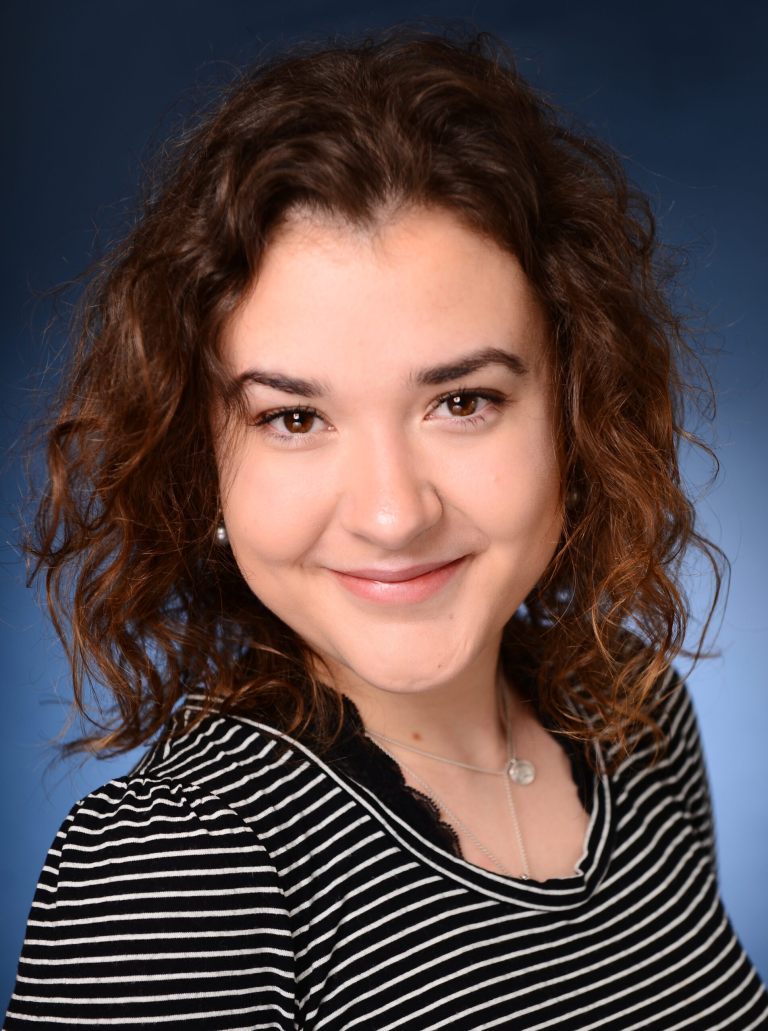
New MD student: Welcome Alina!
Alina Kulka is studying human medicine at the University of Duisburg-Essen. As a medical student she will start her dissertation within the COLA project in the Bingel lab. She will be part of our experimental fMRI study to research about different mechanisms of pain perception.
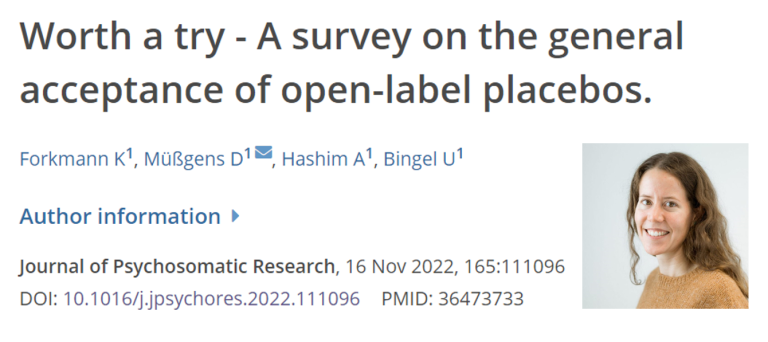
Would you take a placebo?
Although the positive effects of placebos are well known, it is difficult to harness these benefits in clinical practice because deceiving patients about the true nature of their treatment raises legal and ethical concerns. Surprisingly however, placebos can also work if people know they are taking “just” a placebo. But would people be willing to take these “honest”, so called open-label placebos? In their recently published study, Diana Müßgens and colleagues investigated how open people would be to taking such open-label placebos. In an online survey of 532 respondents, they found that most people were willing to try placebos, especially if they were prescribed in addition to an ongoing treatment. The most convincing arguments for trying placebos were positive results from research studies and recommendations by physicians. Therefore, they argue, it is well worth to further explore the use of open-label placebos and to optimize the ways in which researchers and clinicians communicate this knowledge.
Our letter “Worth a try – A survey on the general acceptance of open-label placebos” is now published in the Journal of Psychosomatic Research.
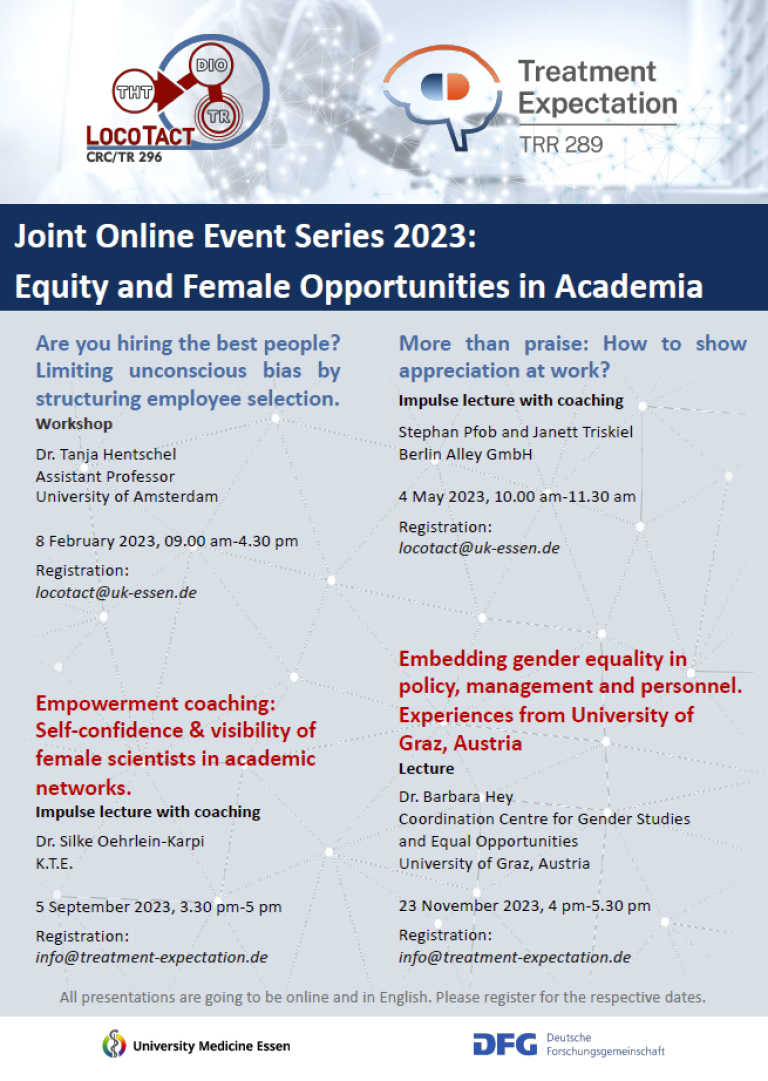
Virtual event series “Equity and Female Opportunities in Academia” together with the CRC/TRR 296 LOCOTACT
We are pleased to announce a joint workshop and lecture series “Equity and Female Opportunities in Academia” in 2023 from the Collaborative Research Centres 289 and 296. With this workshop/talk series, we want to offer to all members of Treatment Expectation and LOCOTACT the opportunity to get deeper into various topics regarding diversity in academia and to take advantage of one-on-one coaching sessions. Relevant topics such as biases in recruitment processes, appreciative communication, visibility of female scientists, as well as gender equality aspects in politics, management and personnel selection will be highlighted.
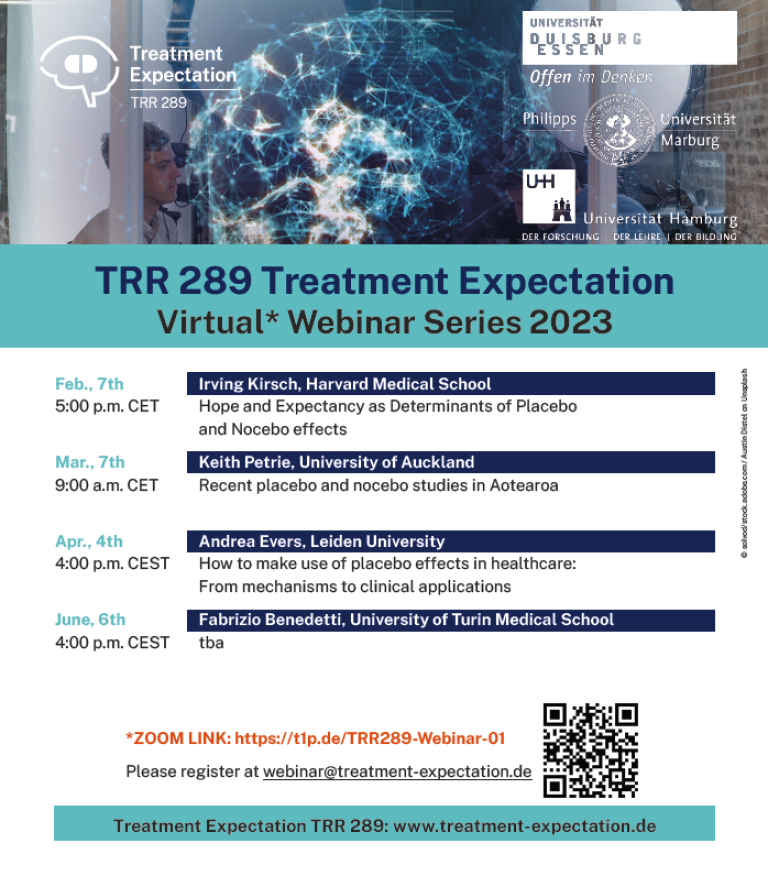
New SFB/TRR 289 webinar speakers
The new program of our webinar series for the first half of 2023. We are delighted to have Keith Petrie (University of Auckland), Irving Kirsch (Harvard Medical School), Fabrizio Benedetti (University of Turin), and Andrea Evers (Leiden University) as invited guest speakers. Each session will begin with a short data blitz or study impulse by one of our early career researchers. You can now rewatch all of the previous webinars here.
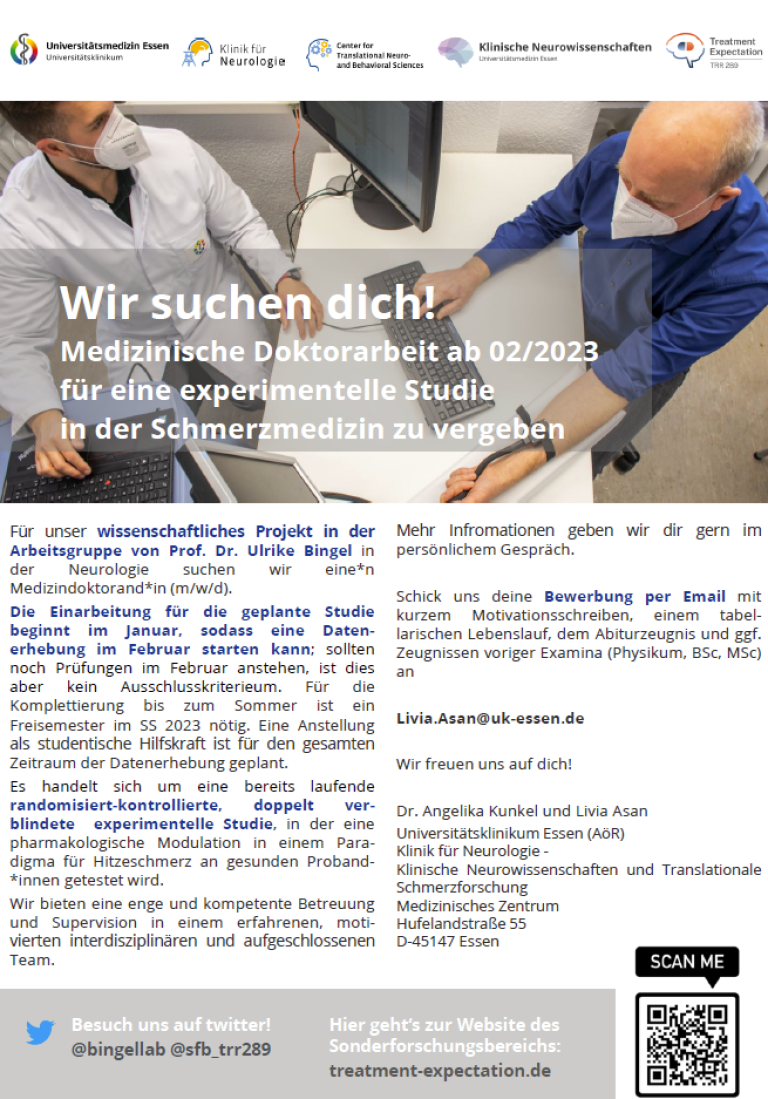
MD student wanted!
We are looking a motivated medical doctoral student to join our research group and write their medical doctoral thesis within an ongoing project. More infos (in German) on the flyer above.
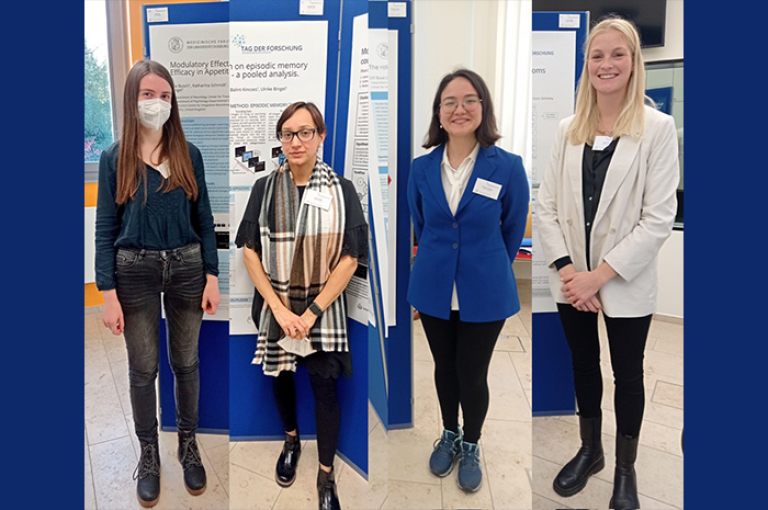
We participated in the Forschungstag 2022!
Today four of our PhD and medical doctoral students (from left to right: Lea Busch, Jaspreed Kaur, Elif Buse Caliskan and Linda Ludwig) are presenting their work at the Tag der Forschung of the University Medicine Essen, and some of our postdocs are acting as reviewers & evaluating other posters. Good luck to all for their presentations and fingers crossed for the poster prizes! More information about the Forschungstag can be found here.
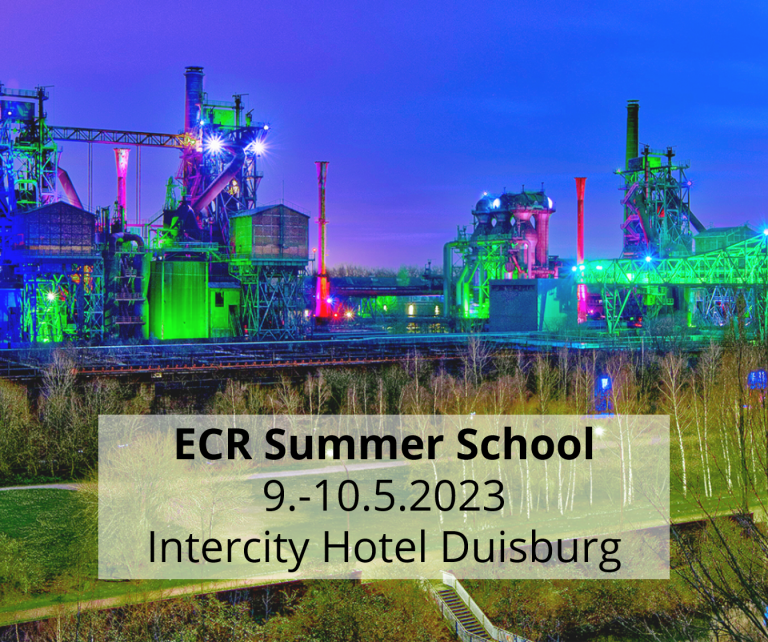
ECR Summer School 2023 calls for applications
The Early Career Researcher (ECR) Summer School, organized by the CRC/TRR 289 “Treatment Expectation” and preceding and connected to SIPS 2023 in Duisburg, Germany, combines theoretical lectures with active “hands-on” workshops and networking opportunities.
Alongside subject-specific basics of placebo and nocebo effects, the program will focus on practical skills such as statistics (Bayesian analysis), as well as meta-scientific skills such as open science, science communication and online presence as a scientist (e.g., social media, own website). In addition, a final discussion session will provide a framework to share issues and challenges in one’s own research, both with peers and more experienced scientists. In this way, the summerschool will prepare the participants in the best possible way for participation in the SIPS and for their own scientific careers. Social events, e.g. a planned pub quiz, in the evening will round off the program and invite people to get to know each other.
In case of a successful application, the summer school is free of charge, and the application is separate from registration to the SIPS conference.
More information can be found here.

The Bingel Laboratory
Prof. Dr. med. Ulrike Bingel
Clinical Neurosciences
University Hospital Essen
Department of Neurology
Hufelandstraße 55
45147 Essen
Germany
Fon: +49 (0) 201 723 - 2446
Fax: +49 (0) 201 723 - 6882
Mail:
Copyright 2021 - Bingel Laboratory



